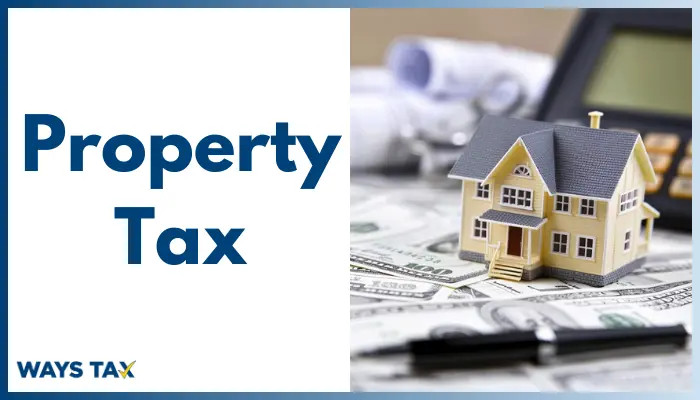
Property Tax in Pakistan: Pay Without Hassle
One of property owners’ most important financial responsibilities is paying property taxes. Property taxes are an essential component of staying in line with local laws. Doesn’t matter if you own land for residential, business, or agricultural purposes.
Property tax in Pakistan ranges from 5% to 20% of the property’s annual rental value, depending on the property’s location and usage.

However, understanding the complexities of property tax can be difficult, especially when you’re unaware about the processes, tax rates, or filing requirements. If you are one of those, don’t worry, we are here to guide you and assist you in paying your property tax.
This blog will guide you through the key aspects of property tax and explain why our expert services can save you time, money, and potential legal hassles.
What is Property Tax?
Property tax is a fee imposed by local governments or municipal authorities on property owners depending on the property’s worth. The tax rate varies by area and type of property owned, with residential properties often having lower rates than commercial.
These taxes support local services including road repair, public safety, and education.
3 Key Components of Property Tax:
- Assessment of Property Value: The local authorities determine the market worth of your property. This evaluation takes into account location, size, and building type.
- Tax Rate: Once the property value has been evaluated, a specific tax rate determined by local authorities is used to compute the property tax due.
- Tax Collection: Property owners must pay the tax on an annual basis. Late payments may lead to fines or possibly legal action.
Who is Eligible for Property Tax?
Property owners are generally eligible to pay property taxes. Here is a basic breakdown:
- Residential Property Owners: Homeowners are required to pay property tax on their homes, flats, or villas, normally at a lesser rate.
- Commercial Property Owners: Commercial property owners face higher tax rates.
- Industrial Property Owners: They must pay property taxes, which are frequently similar to commercial property rates.
- Agricultural Landowners: Depending on provincial rules, certain agricultural lands may be taxed at a reduced rate or be exempt.
- Landowners: Landowners who own vacant land are also required to pay property taxes.
Exemptions:
- Government buildings, religious institutions, and certain non-profits may be exempt.
- Senior citizens and disabled individuals might qualify for tax relief.
Stay Ahead of Your Property Taxes!
Use Waystax to easily manage, track, and reduce your property tax burden today!

Documents Required for Property Tax

To complete property tax filings and transactions, the following documents are required:
- CNIC Copies: Both the seller’s and purchaser’s valid CNIC copies.
- Title Document: Proof of ownership, including signatures and presence of both the seller and purchaser.
- Photographs: Recent photographs of both parties involved in the transaction.
- Tax Documents: Relevant tax documents, including advance tax, town tax, capital gains tax, C.V.T. (Capital Value Tax), and stamp duty receipts.
- Mutation (Extract from FC.M): A mutation document verifying property ownership record
Apply for PT-1 Record
- Application on plain paper from a registered property owner with the appropriate court fee attached
- A copy of the applicant’s CNIC
- Proof of current property tax payment
How Much Is The Property Tax in Pakistan?
The official property tax rates in Pakistan are as follows:
| Property Type | Tax Rate |
| Standard Tax | 0.5% of the annual rental value (5% of the property’s total value) |
| Residential Rented Property | 7.5% tax on the annual rental value |
| Commercial/Industrial Rented Property | 10% tax on the annual rental value |
Procedure for Property Assessment
- Property assessment is determined by the type of building and its use (commercial or residential).
- Local criteria are set for properties based on whether they are self-occupied or rented.
- These locality-based benchmarks are used to calculate the annual value of the property.
- Property tax is charged based on the calculated annual value of the property.
- The tax rates applied depend on the determined annual value.
Time and Mode of Property Tax Payment
- Property Tax can be paid by September 30th to receive a 5% rebate on the tax amount for the current financial year.
- After receiving the Demand Notice, taxpayers are given 30 days to make the payment using the provided Challan Form.
- Payments are accepted at the Treasury, State Bank, or specified branches of the National Bank of Pakistan.
- Cheques can also be used for payment, accompanied by the Challan Form, and should be made out in favor of the Excise & Taxation Officer of the respective district.
Rebate and Additional Property Tax Charge
- If the entire tax liability is paid in one lump payment by September 30 of the fiscal year, a 5% rebate on the annual tax is given.
- Every month following the deadline for late payments of September 30th, there is an additional 1% fee on the gross payable tax. The surcharge keeps adding up on the first of every month after that until the tax is paid in full.
Property Tax Exemptions in Detail
- Public spaces, such as parks, playgrounds, schools, hospitals, libraries, and hostels, are exempt from property tax.
- Widows, orphans, and individuals with disabilities are exempt if their property tax dues do not surpass PKR 12,150/- per year.
- Properties used exclusively for religious purposes or belonging to public charitable institutions are exempt.
- Federal or Provincial government retirees who own and reside in one residential house up to 1 Kanal receive tax exemption.
- Residential houses constructed on land less than 5 Marla, except in category “A” localities, qualify for tax exemption.
- Properties with an annual rent lower than PKR 4,320/- are exempt.
- A house occupied by the owner with a rent not exceeding PKR 6,480/- annually is exempt.
- Buildings owned by the government or local authorities, such as corporations or municipalities, are exempt.
- Mosques and other places of worship are not subject to property tax.
Property Tax Notices Explained
P.T – 10 Notice:
- This notice acts as a challan containing the assessee’s name, property number, current financial year’s tax amount, any arrears, and the last payment date.
- Upon receipt, the assessee is required to deposit the tax by the due date at designated branches of the National Bank or State Bank of Pakistan.
- The challan has three parts: one is sent to the Excise and Taxation (E&T) department, while the assessee should submit a photocopy of the receipt to ensure proper recordkeeping.
P.T – 11 Notice:
- If the tax is not paid on time as specified in the P.T – 10 notice, a penalty equal to the unpaid tax may be imposed.
- The P.T – 11 notice provides the assessee an opportunity to explain the reasons for the delayed payment before any penalty is enforced. This can be done in person or through a representative.
P.T – 14 Notice:
- If the property owner fails to pay the property tax, this notice is issued to the tenant, obligating them to deposit the rent in the Government Treasury until the outstanding tax is settled.
- The tenant deposits rent using the P.T – 10 challan until the tax liability is cleared.
P.T – 13 Notice:
- When the Assessing Authority becomes aware of changes to a property’s description, use, possession, or ownership, they issue a P.T – 13 notice.
- The notice includes the details of the change and any reassessed tax. The recipient has 14 days to file an objection with the E&T department; otherwise, the changes become final.
Benefits of Property Tax
1. Improvement in Local Infrastructure
Local governments mainly depend on property taxes as a source of funding for vital services including public transportation, water supply systems, and highways. Properly maintained infrastructure boosts property values and enhances the standard of living for people, thereby helping property owners.
2. Enhanced Public Services
Better public services like garbage management, law enforcement, and fire protection are made possible in part by property taxes. By ensuring the neighborhood is clean, safe, and generally livable, these services can draw in additional purchasers and tenants and raise the value of the property.
3. Protection of Property Value
Property taxes are used to fund infrastructure and community services, which maintains or improves the neighborhood’s general quality. Better infrastructure and services also tend to make communities more desirable, which boosts property values and benefits property owners directly financially.
4. Increased Marketability of Property
Property taxes contribute to developing aesthetically pleasing neighborhoods by funding parks, recreational centers, and other amenities in places with a well-funded local government.Properties with these attributes are more marketable, which raises the possibility of increased rental income or resale value.
5. Local Economic Stability
Local governments rely on property taxes as a reliable and consistent funding source to plan long-term community improvements and services. A community’s economic stability relates with steady or rising property values, which lowers the risk of depreciation for property owners.
6. Tax Deduction Benefits
Property taxes are deductible against federal income taxes in many nations. In effect, this tax deduction lowers the cost of ownership for property owners by assisting in the reduction of their overall tax burden.
7. Equity in Community Development
By ensuring that everyone pays their fair part for community services and improvements, property holders make sure municipal budgets are supported by property taxes. This encourages open growth, which is advantageous to all locals—property owners included.
Property Tax: FAQ
Simplify Your Property Tax Process with Ways Tax
Paying property tax in Pakistan may be difficult and scary for many property owners, whether they own residential, commercial, or agricultural properties. With different tax rates, assessments, and filing requirements, it’s easy to become overwhelmed.
Our skilled team simplifies the entire property tax process, allowing you to remain compliant while saving time and money. Let us manage the complexity of your property tax so you can focus on what’s most important.
Contact us for professional assistance in making the property tax procedure simple and hassle-free!
